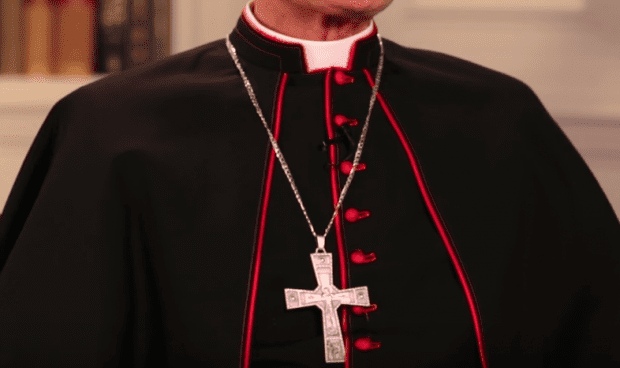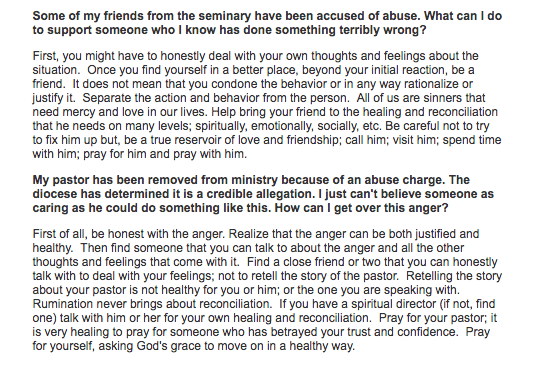Bishops Without Chests

1. I’ve given my whole life to serving Christ in His Church. Since beginning the seminary in 1994, every year has brought fresh revelations of the darkest corruption along with criminal moral perversion coupled to unbelievable levels of incompetence.
— Fr. Phillip W. DeVous (@PDeVous) August 14, 2018
https://platform.twitter.com/widgets.js
2. Then I read the papers or catch the evening news and I see Cardinals and bishops that I know for a fact are lying with impunity deploying weasel words and fake emotions.
— Fr. Phillip W. DeVous (@PDeVous) August 14, 2018
https://platform.twitter.com/widgets.js
3. Until I went to the seminary I was not aware of knowing a single criminal sex abuser. Since then, apparently, I’ve rubbed elbows with dozens, some being high-ranking prelates. And those are just the ones whose names have made into reports and news stories.
— Fr. Phillip W. DeVous (@PDeVous) August 14, 2018
https://platform.twitter.com/widgets.js
4. Without The New York Times, The Boston Globe, and the Pennsylvania Attorney General’s Office, the Bishops would still be lying, obfuscating, and making asinine and entirely forgettable remarks about economics and immigration…
— Fr. Phillip W. DeVous (@PDeVous) August 14, 2018
https://platform.twitter.com/widgets.js
5. …while ignoring corruption, abuse of power, criminal carnality, abortions procured by predator priests, systemic homosexual predation, pedophilia, sexual harassment, and rape IN THEIR OWN RANKS.
— Fr. Phillip W. DeVous (@PDeVous) August 14, 2018
https://platform.twitter.com/widgets.js
6. And despite these revelations they don’t appear to be all that upset about it.
— Fr. Phillip W. DeVous (@PDeVous) August 14, 2018
https://platform.twitter.com/widgets.js
7. One gets the sense they are just saying words-if they’re saying anything at all-so they can minimize the harm done to diocesan collections. They sound like damage control consultants, not fathers who’ve had THEIR families attacked and molested.
— Fr. Phillip W. DeVous (@PDeVous) August 14, 2018
https://platform.twitter.com/widgets.js
8. I don’t know what to think about all this anymore.
— Fr. Phillip W. DeVous (@PDeVous) August 14, 2018
https://platform.twitter.com/widgets.js
These tweets should make it clear that among those suffering from the Catholic bishops’ failures are good parish priests, who are being dragged down into the muck with the rest. What Father DeVous says in No. 7 is one of the enduring mysteries of this whole thing: why bishops do not act like normal human fathers in the face of this monstrous evil. Look at this excerpt from a Q&A on the website of the US Conference of Catholic Bishops:

The language is about managing anger, in particular about finding compassion for the abuser, and training yourself not to talk to others about it. The bishops speak in a language you might describe as Corporate Therapeutic.
Consider this August 7 column by Bishop Richard Malone of Buffalo, who had his vacation marred by the rabble talking about the late unpleasantness:
As I write this column, I’m just home from some restful days back in Massachusetts, where I lived for 58 of my 72 years until I was called to Maine and then Western New York. It is always a grace to reconnect with cherished people and places, and to enjoy for a few days the beautiful and calming sight, sound and smells of the Atlantic Ocean.
I must admit that this year, unlike others since I’ve come to Buffalo, my time away for R&R was clouded by the challenges we are facing right now in our diocese.
Apparently some of the laity are withholding contributions to protests the way bishops handled the abuse crisis. Bad laity! Bad!:
On a positive note, I am so very grateful to all the good people whose compassion and generosity helped us to reach our $11 million Catholic Charities Appeal goal. It was a unique struggle this year as a result of the abuse crisis. I fully understand and share the disappointment, disgust, anger and betrayal so many people feel over the shameful violations of trust perpetrated in the past by a number of priests of our diocese. With changes in policies and procedures both nationally and in our diocese over the past several years, we are responding to abuse complaints better than in the past. We will continue that commitment going forward.
Regarding the Catholic Charities Appeal, though, I do not understand, and cannot accept, the logic behind the decision on the part of some individuals to express their dismay by holding back on their contributions to Catholic Charities – a decision that only harms those people who look to us for necessary assistance in times of serious need. My heartfelt thanks to those of you who did not succumb to such unfortunate and, I believe, flawed thinking.
We’ve got new policies and procedures, so what more do you people want? Just pay up and let’s get back to being “people of hope” (he really does use that smarmy phrase).
It takes a layman to say the bleeding obvious:
The temptation to look to public relations experts, to limit damage, to moderate judgment, to minimize the sacrifices necessary is understandable. But resist this. Show the world what true penitence looks like. Sacrifice more, not less. Ordinary time become penitential season.
— C. C. Pecknold (@ccpecknold) August 15, 2018
https://platform.twitter.com/widgets.js
I honestly wonder, though, if the system that grooms bishops selects for men without chests. Reader Sam M. admires his bishop, Persico of Erie, Pa., who, he says, fired the lawyers telling him not to cooperate with the grand jury probe, and instead has tried to be transparent, unlike his corrupt predecessors. It seems much more common that bishops respond like Malone, or like Cardinal Donald Wuerl, who had a fancy website built and ready for launch when the grand jury probe dropped. Here’s some Corporate Therapeutic for you, from that site:
The Church in the United States has attempted to confront child sexual abuse, taking responsibility for the wrongs of the past and committing to doing all that we can to prevent the tragedy of abuse from happening again. Over the past three decades, bishops in the United States have put in place strict requirements for reporting allegations to civil authorities because we recognize that abuse is not only a sin, but also a serious crime.
While I served as Bishop of the Diocese of Pittsburgh, and as our understanding of child sexual abuse increased, the Diocese worked to strengthen our response and repeatedly amended the Diocese’s safeguards and policies. The Diocese worked to meet or exceed the requirements of the United States Conference of Catholic Bishops and the reporting requirements of Pennsylvania law. We showed pastoral concern by reaching out to victims and their families, while reporting allegations to the authorities so they could investigate crimes. The Diocese’s goal was to be transparent and accountable to the public, and to our faithful, for what had occurred within the Church.
Even if all these things are true, do you see the problem? He’s talking about this like a CEO. That narcotic Corporate Therapeutic talk is meant to anesthetize you in the face of facts like this about the Diocese of Pittsburgh, taken from the grand jury report (pp. 233-35):
George was raised as a Catholic and attended Catholic School from first through twelfth grade. While at St. Adalbert’ s on the South Side of Pittsburgh, George served as an altar boy.
George became friends with [Father] Zirwas in the mid -1970’s. Zirwas would spend time at George’s home and take George to lunch or dinner on occasion. George’s family encouraged the contact with Zirwas based upon the belief that Zirwas would be a good influence on George. George noted that that his Catholic family looked at priests as “very truth worthy, very elevated.”
As George was transitioning from middle school to high school, Zirwas took him on trips, took him to see St. Paul Seminary, and, even taught him how to drive. Over time, Zirwas began to take George with him as he carried out priestly duties and on his visits with parishioners. Zirwas started introducing George to his “friends” who were priests who seemed to share similar interests. On one occasion, Zirwas took George to a parish rectory in Munhall where the following priests were present: Father Francis L. Pucci, Father Richard Zula, and Father Francis Luddy of the Diocese of Altoona -Johnstown.
The priests began a conversation about religious statues and asked George to get up on a bed. As the priests watched, they asked George to remove his shirt. They then drew an analogy to the image of Christ on the cross, and told George to remove his pants so that his pose would be more consistent with the image of Christ in a loincloth. At that point, the priests began taking Polaroid pictures of George. As the picture taking continued, the priests directed George to take off his underwear. George was nervous and complied.
George recalled that either Zula or Pucci operated the camera. He stated that all of the men giggled and stated that the pictures would be used as a reference for new religious statues for the parishes. George testified that this occurred before he turned 18 -years -old and that his genitals were exposed in the photographs. George stated that his photographs were added to a collection of similar photographs depicting other teenage boys.
George recalled that each of these priests had a group of favored boys who they would take on trips. The boys received gifts; specifically, gold cross necklaces. George stated, “He [Zirwas] had told me that they, the priests, would give their boys, their altar boys or their favorite boys these crosses. So he gave me a big gold cross to wear.” The Grand Jury observed that these crosses served another purpose beyond the grooming of the victims: They were a visible designation that these children were victims of sexual abuse. They were a signal to other predators that the children had been desensitized to sexual abuse and were optimal targets for further victimization.
It is not known whether or not Bishop Wuerl knew about the pedophile ring, but he certainly knew that Father Zirwas was a problem. Wuerl took over as bishop in 1988. From the grand jury report:
The Grand Jury learned that the Diocese was aware of complaints against Zirwas for sexually abusing children as early as 1987. Additional complaints were received between 1987 and 1995. However, Zirwas continued to function as a priest during this period and was reassigned to several parishes.
Father Zirwas, by the way, lived with his boyfriend in Havana, where he called himself “the Grand Duchess” and hosted transvestite lip-synch parties. Read about his life and death here.
When faced with revelations of this astonishing depravity, all Cardinal Wuerl can muster is a slick website and a stout dose of Corporate Therapeutic. It ain’t exactly kneeling penitentially in the snow at Canossa.
There’s a story from Italy this morning about a parish priest who finally resigned after his bishop would not back the stand he took on a gay marriage that took place in his parish. Rather than support the priest, the bishop reassigned him. Reader Giuseppe Scalas observes archly of the bishop, “And those are the ones who should teach us to march to martyrdom with no fear… .”
If ever the Catholic Church should attempt to reform itself, it will have to deal with why its bishop-making system typically selects for men without chests. The phrase is C.S. Lewis’s, from The Abolition of Man:
We make men without chests and expect of them virtue and enterprise. We laugh at honour and are shocked to find traitors in our midst. We castrate and bid the geldings be fruitful.
This is a serious problem. A very serious problem.
Subscribe for as little as $5/mo to start commenting on Rod’s blog.